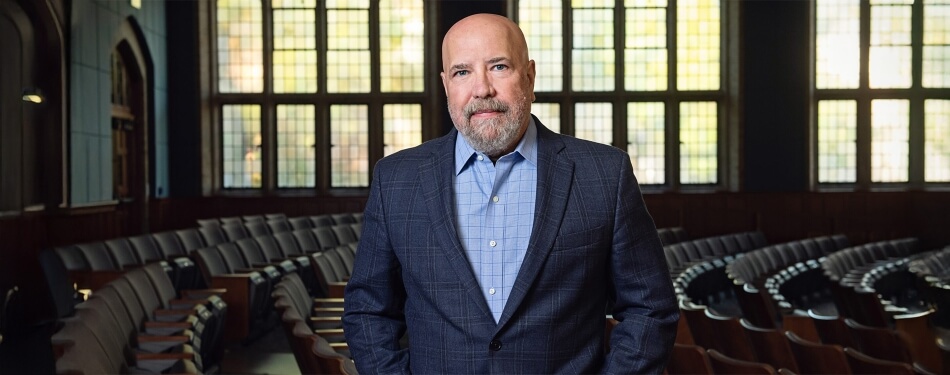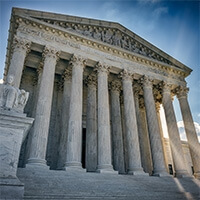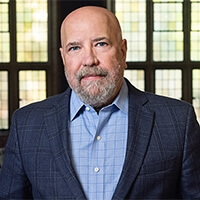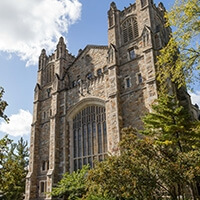“There’s a lot of talk about the rule of law these days, so let me clarify that I’m going to focus on just two of the ideas that it represents. The first is the idea that everyone is accountable under the law and no one is above it. And the second is that our constitutional system depends on a strong and independent legal profession and judiciary.”
–—
With those words, Michigan Law Professor Len Niehoff began an address that encouraged fellow members of the ABA Litigation Section to defend against what he sees as current threats to the rule of law from the Trump administration.
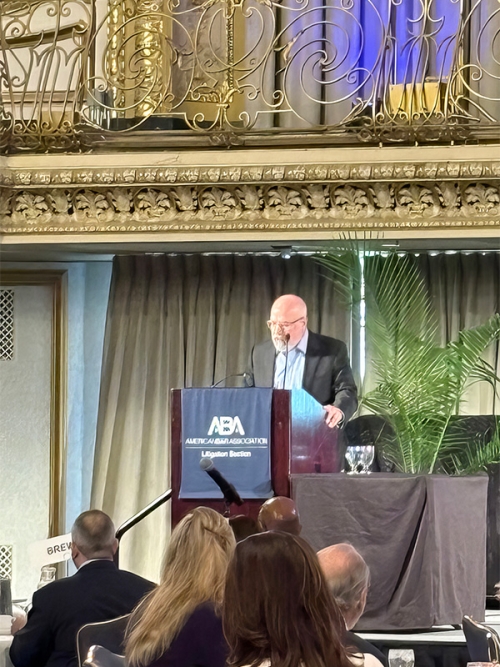
Niehoff delivered the keynote address, titled “Not Dead, Though It Hath Slept: Thoughts on the Rule of Law,” to the Litigation Section’s Annual Conference in Chicago in May. The speech expanded on themes that Niehoff explored in an editorial he published in February in Detroit News, where he serves as legal counsel and occasional opinion writer.
He shared the Detroit News piece with the chair of the Litigation Section, Larry Kristinik, who had recently supported a statement by ABA President William Bay, ’78, regarding the rule of law. Kristinik promptly invited Niehoff to be a keynote speaker at the Litigation Section’s conference.
Niehoff’s main challenge in adapting the article for the keynote address was in keeping up with developments between the February invitation to speak and the May conference.
“I probably revised that speech 30 times,” he said, “because every day there was a new development, something that had to be changed, sometimes significantly. It was like shooting at multiple moving targets.” One such development literally happened as he made his way from his hotel room to the ballroom to speak; he received a request from a Washington Post reporter to provide his reaction to the executive order ceasing funding to NPR and PBS.
“I had to turn around and go back into my hotel room and respond to the request,” he said. “I started the speech by saying, ‘For all I know, things have changed yet again during my walk up to this podium.’”
–—
“I should also stress that the orders and policies that these courts have enjoined haven’t involved trivial matters. To the contrary, many of them have cut to the very heart of our constitutional order, offending principles like the separation of powers, the fiscal authority of Congress, and the rights of due process and freedom of speech.”
–—
In his speech, Niehoff stated that the courts have limited the actions of the president since he took office on January 20.
He pointed to a March 31 analysis by Professor Stephen Vladeck of Georgetown Law School, who reviewed cases asking for some form of preliminary relief against a policy undertaken or proposed by the administration. Vladeck found the district courts had granted some type of preliminary relief 68.7 percent of the time.
“Given the demanding standard for obtaining such a remedy, and the delicacy inherent in asking a court to enjoin the executive branch, that’s an impressive success rate,” Niehoff told the conference. He added that this response hadn’t come just from judges appointed by Democrats, but from judges appointed by presidents across the political spectrum.
Among the judicial actions he cited were the decision by Judge Trevor McFadden (a Trump appointee) that limiting Associated Press access to the White House violated the First Amendment and the opinion by Judge Fernando Rodriguez (also a Trump appointee) that the president wrongfully used the Alien Enemies Act to justify deportations without due process.
In discussing threats to the rule of law, Niehoff also pointed to situations not involving the judiciary, such as the president’s pardons of hundreds of individuals charged in the January 6 attacks. And he expressed concern over some of the president’s claims that lawful actions (such as a boycott of Tesla) are unlawful.
In the month following his speech, Niehoff sees little change in the president’s actions or the judiciary’s response.
“There hasn’t been any dramatic shift. The courts haven’t suddenly gone in a different direction. The administration isn’t suddenly doing a lot better in court than they were doing. If anything, they’re doing worse.”
–—
“Shakespeare has a lesson for us. In Henry VI, Part 2, the word ‘law’ gets thrown around with such abandon that it finally loses its meaning. ‘Law’ comes to signify ‘whatever the law would be if it served my agenda.’ Shakespeare shows us that the rule of law suffers not just from its violation, its pardoned breach, and its casual disregard, but from its dilution by claims that it stands for principles that it doesn’t.”
–—
As Niehoff continued his speech, he often alluded to the works of Shakespeare. He has the credentials to do so, as he teaches a seminar on Shakespeare and the Law and is writing a book on the topic. In his speech, he noted that Henry VI, Part 2 includes the memorable quote “The first thing we do, let’s kill all the lawyers.” He suggested that the president’s executive orders against prominent law firms reflected a strategy of “The first thing we do, let’s chill all the lawyers.” He added that the play also has important warnings about how law can be manipulated and abused in a quest for political power.
Niehoff says that in his book he’ll explore many other connections between Shakespeare and the law, including plays that might not seem like obvious candidates for discussion.
“Right now I’m working on the chapter on Macbeth,” he said. “Macbeth might appear to have little to do with the law. But the play tells us a lot about the fragility of political order and the nature of human conscience—both issues of great interest to the law.”
Despite the fact that these and other plays are more than 400 years old, they remain relevant to lawyers today.
“Everybody claims the law is on their side,” he said. “In a number of the plays, the villains are among those who invoke the law the most and talk most about the importance of lawfulness.”
–—
“ABA President Bill Bay has praised the courage of these judges for doing their jobs amidst these inexcusable—in some instances, criminal—efforts to intimidate. Let’s be honest: Right now, individual federal judges are bearing a disproportionate part of the burden of preserving the rule of law. In my view, what many of them are doing is nothing short of heroic, and we owe them our vocal support, our thanks, and our applause.”
–—
In his speech, Niehoff expressed hope for the rule of law despite the current dangers. Much of that hope lies in the judiciary, which is currently serving as a check on the executive branch.
Niehoff notes that judges have held firm in the month since he gave his speech. “An analysis by Stanford professor Adam Bonica suggests the administration had a 96 percent loss record in the month of May in the various pending district court proceedings,” he said. “That’s an astonishing loss record. And it really speaks to the strength of the judicial response.”
In this speech, though, Niehoff told the assembled that the burden of defending the rule of law falls on them as well. His words and that call to action drew a standing ovation from attendees as he concluded his address. He continues to receive positive feedback as the ABA shares the speech in various online channels.
“I think people were just really hungry for somebody to say what they were thinking,” Niehoff said. “The rule of law should be a nonpartisan principle. And it should be a nonnegotiable one as well.”

